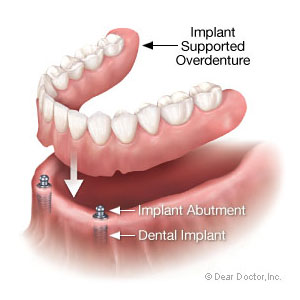Generations have depended on dentures to effectively and affordably replace lost teeth. But they have a major weakness: They contribute to jawbone loss that creates mouth and facial problems and can also ruin a denture’s fit. Bone loss is a normal consequence of losing teeth. The biting forces are normally generated when we chew to stimulate the new bone to replace older bone. When a tooth is missing, however, so is that chewing stimulation. This can slow bone replacement growth and gradually decrease the density and volume of the affected bone. While dentures can restore dental appearance and function, they can’t restore this growth stimulation. What’s worse, the pressure of the dentures against the gum-covered jaw ridge they rest upon may irritate the underlying bone and accelerate loss.
Implant-supported denture
But there is a solution to the problem of denture-related bone loss: an implant-supported denture. Rather than obtaining major support from the gum ridges, this new type of denture is secured by strategically-placed implants connecting with it.
Besides the enhanced support they can provide to a denture restoration, dental implants can also deter bone loss. This is because of the special affinity bone cells have with an implant’s embedded titanium post. The gradual growth of bone on and around the implant surface not only boosts the implant’s strength and durability, it can also improve bone health.
There are two types of implant-supported dentures. One is a removable appliance that connects with implants installed in the jaw (three or more for the upper jaw or as few as two for the lower). It may also be possible to retrofit existing dentures to connect with implants.
The other type is a fixed appliance a dentist permanently installs by screwing it into anywhere from four and six implants. The fixed implant-supported denture is closer to the feel of real teeth (you’ll brush and floss normally), but it’s usually more costly than the removable implant-supported denture.
While more expensive than traditional ones, implant-supported dentures still cost less than other restorations like individual implant tooth replacements. They may also help deter bone loss, which may lead to a longer-lasting fit with the dentures. Visit your dentist for an evaluation of your dental condition to see if you’re a good candidate for this advanced form of dental restoration.
If you would like more information on implant-supported dentures, please contact us or schedule an appointment for a consultation. You can also learn more about this topic by reading the Dear Doctor magazine article “Overdentures & Fixed Dentures.”

